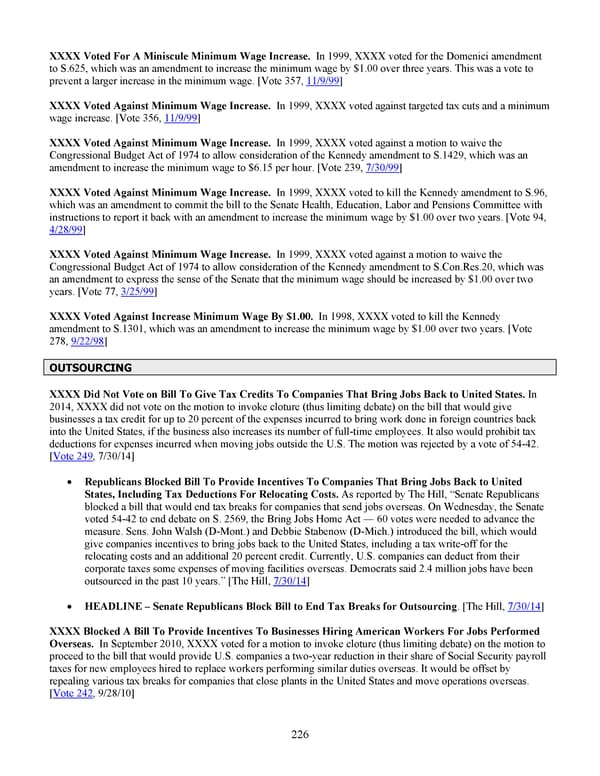XXXX Voted For A Miniscule Minimum Wage Increase. In 1999, XXXX voted for the Domenici amendment to S.625, which was an amendment to increase the minimum wage by $1.00 over three years. This was a vote to prevent a larger increase in the minimum wage. [Vote 357, 11/9/99] XXXX Voted Against Minimum Wage Increase. In 1999, XXXX voted against targeted tax cuts and a minimum wage increase. [Vote 356, 11/9/99] XXXX Voted Against Minimum Wage Increase. In 1999, XXXX voted against a motion to waive the Congressional Budget Act of 1974 to allow consideration of the Kennedy amendment to S.1429, which was an amendment to increase the minimum wage to $6.15 per hour. [Vote 239, 7/30/99] XXXX Voted Against Minimum Wage Increase. In 1999, XXXX voted to kill the Kennedy amendment to S.96, which was an amendment to commit the bill to the Senate Health, Education, Labor and Pensions Committee with instructions to report it back with an amendment to increase the minimum wage by $1.00 over two years. [Vote 94, 4/28/99] XXXX Voted Against Minimum Wage Increase. In 1999, XXXX voted against a motion to waive the Congressional Budget Act of 1974 to allow consideration of the Kennedy amendment to S.Con.Res.20, which was an amendment to express the sense of the Senate that the minimum wage should be increased by $1.00 over two years. [Vote 77, 3/25/99] XXXX Voted Against Increase Minimum Wage By $1.00. In 1998, XXXX voted to kill the Kennedy amendment to S.1301, which was an amendment to increase the minimum wage by $1.00 over two years. [Vote 278, 9/22/98] OUTSOURCING XXXX Did Not Vote on Bill To Give Tax Credits To Companies That Bring Jobs Back to United States. In 2014, XXXX did not vote on the motion to invoke cloture (thus limiting debate) on the bill that would give businesses a tax credit for up to 20 percent of the expenses incurred to bring work done in foreign countries back into the United States, if the business also increases its number of full-time employees. It also would prohibit tax deductions for expenses incurred when moving jobs outside the U.S. The motion was rejected by a vote of 54-42. [Vote 249, 7/30/14] Republicans Blocked Bill To Provide Incentives To Companies That Bring Jobs Back to United States, Including Tax Deductions For Relocating Costs. As reported by The Hill, “Senate Republicans blocked a bill that would end tax breaks for companies that send jobs overseas. On Wednesday, the Senate voted 54-42 to end debate on S. 2569, the Bring Jobs Home Act — 60 votes were needed to advance the measure. Sens. John Walsh (D-Mont.) and Debbie Stabenow (D-Mich.) introduced the bill, which would give companies incentives to bring jobs back to the United States, including a tax write-off for the relocating costs and an additional 20 percent credit. Currently, U.S. companies can deduct from their corporate taxes some expenses of moving facilities overseas. Democrats said 2.4 million jobs have been outsourced in the past 10 years.” [The Hill, 7/30/14] HEADLINE – Senate Republicans Block Bill to End Tax Breaks for Outsourcing. [The Hill, 7/30/14] XXXX Blocked A Bill To Provide Incentives To Businesses Hiring American Workers For Jobs Performed Overseas. In September 2010, XXXX voted for a motion to invoke cloture (thus limiting debate) on the motion to proceed to the bill that would provide U.S. companies a two-year reduction in their share of Social Security payroll taxes for new employees hired to replace workers performing similar duties overseas. It would be offset by repealing various tax breaks for companies that close plants in the United States and move operations overseas. [Vote 242, 9/28/10] 226
 HRC vote skeleton Page 243 Page 245
HRC vote skeleton Page 243 Page 245